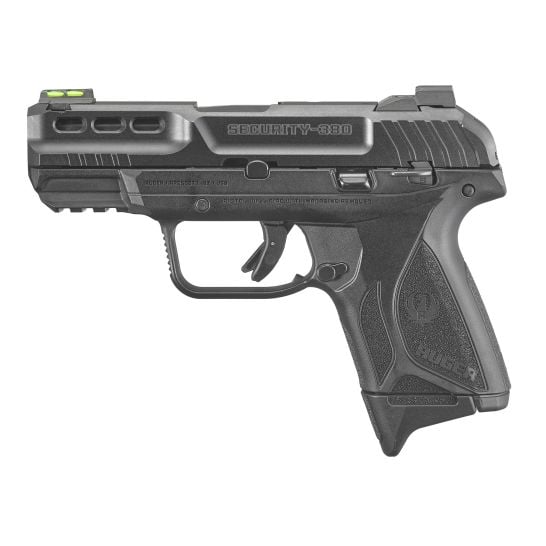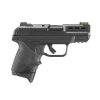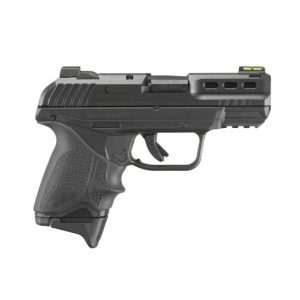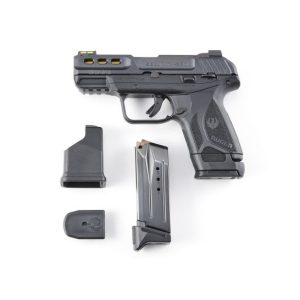Ruger Security-380 .380 ACP Pistol, 3.42" Barrel, Adjustable Fiber Optic Sights, Black – 3855 For Sale
$272.99
The Ruger Security-380 model 3855 is a well-balanced handgun chambered in .380 Auto, catering to both novice and experienced shooters with its blend of performance, convenience, and affordability. Featuring a compact and lightweight frame, it’s ideal for all-day carry without sacrificing reliability or comfort. Its ergonomic design and manageable recoil enhance the shooting experience, while the Lite Rack system—with refined slide serrations, prominent cocking ears, and a lighter recoil spring—ensures easy slide manipulation. Paired with low-recoiling .380 ammunition, it’s perfect for skill-building at the range. The pistol includes two steel magazines and features a lightweight slide with a fiber optic front sight and a drift-adjustable steel rear sight for improved accuracy. Overall, the Ruger Security-380 offers ease-of-use and high performance, making it both an excellent training tool and a reliable carry option.
Will a 380 stop an intruder?
The effectiveness of using a .380 caliber firearm to stop an intruder depends on several factors, including shot placement, the type of ammunition used, and the circumstances of the encounter. The .380 ACP (Automatic Colt Pistol) is considered to be on the lower end of the power spectrum for self-defense calibers, but it can still be effective if used accurately.
In self-defense situations, the aim is often to stop the threat rather than inflict lethal damage. Proper training in firearm handling and shot placement is crucial. Hollow-point bullets, which expand upon impact, are generally recommended for self-defense because they are more effective at stopping an intruder by increasing the likelihood of incapacitating them quickly.
However, it is important to note that no firearm or caliber can guarantee a one-shot stop. Ultimately, the decision to use a .380 for home defense should weigh these considerations and potentially involve seeking advice from firearms experts or self-defense professionals.
Is A 380 enough for self-defense?
The suitability of a .380 ACP (Automatic Colt Pistol) for self-defense depends on several factors, including personal comfort, proficiency, and specific use-case scenarios.
Pros of using a .380 for self-defense:
– **Manageable Recoil:** Generally, .380 pistols have less recoil, making them easier to handle, especially for individuals who may be sensitive to larger calibers.
– **Concealability:** Many .380 pistols are compact and lightweight, making them easy to carry and conceal.
– **Ammunition Availability:** .380 ACP ammunition is widely available, and there are various defensive rounds designed to enhance its effectiveness.
Cons of using a .380 for self-defense:
– **Stopping Power:** The .380 ACP is generally considered to have less stopping power compared to larger calibers such as 9mm, .40 S&W, or .45 ACP. This may require more accuracy and precision with shot placement.
– **Limited Range and Penetration:** The smaller caliber may have limitations in terms of range and penetration through certain barriers.
Ultimately, whether a .380 ACP is “enough” for self-defense depends on personal circumstances and preferences. For some, the balance of size, recoil, and concealability is ideal, while others may prefer a larger caliber for greater stopping power. It’s important for individuals to consider training and comfort with the firearm they choose for self-defense.
Is the Ruger Security 380 a striker or hammer?
The Ruger Security 380 is a hammer-fired pistol.
Does a 380 Ruger have a safety?
Yes, some .380 caliber Ruger pistols have safety features. For example, the Ruger LCP II, a popular .380 ACP pistol, incorporates safety features such as a trigger safety and a slide lock, although it does not have a manual thumb safety. It’s important to check the specific model for the safety features it includes.
Will a 380 go through a person?
Yes, a .380 caliber bullet can penetrate a person’s body. The extent of penetration can vary based on factors such as the type of ammunition, the distance from which it is fired, and the part of the body it hits. It is capable of causing serious injury or death.
How lethal is a 380 hollow point?
The lethality of a .380 hollow point bullet depends on several factors, including shot placement, the specific bullet design, barrel length of the firearm, distance to the target, and the circumstances under which it is used. In general, a .380 ACP (Automatic Colt Pistol) hollow point is considered to be less powerful than larger calibers like 9mm or .45 ACP, but it can still be lethal, especially at close range or if vital organs or major blood vessels are hit. Hollow point bullets are designed to expand upon impact, which can cause more tissue damage and increase stopping power compared to full metal jacket rounds. However, effectiveness can vary greatly, so it’s important to consider these factors and understand that any firearm discharge carries the potential for lethality.
Why is .380 illegal?
The legality of .380 caliber firearms or ammunition can vary based on jurisdiction, including national, state, and local laws. Generally, .380 caliber firearms, also known as .380 ACP (Automatic Colt Pistol), are not illegal in many places and are commonly used for self-defense and concealed carry.
However, there might be specific circumstances where .380 firearms or ammunition could be restricted or illegal:
1. **Local or State Regulations**: Some areas might have specific laws or regulations that restrict certain types of firearms or calibers for safety reasons.
2. **Ammunition Restrictions**: Certain types of ammunition, such as hollow points, may be restricted or banned in specific locales.
3. **Firearm Features**: Certain features associated with .380 firearms, like magazine capacity or barrel length, might lead to restrictions.
4. **Import or Export Laws**: International trade regulations might impact the legality of certain firearms or calibers in different countries.
For the most accurate information, it’s essential to consult the specific laws and regulations of the area in question or speak with a legal expert familiar with firearms law.
What are the pros and cons of the 380?
To evaluate the pros and cons of the Airbus A380, often simply referred to as the “380,” we’ll look at various aspects of this aircraft, which is the world’s largest passenger airliner.
### Pros
1. **Passenger Capacity:**
– The A380 can carry more passengers than any other commercial aircraft, with a typical seating capacity of about 555 people in a three-class configuration, or up to 853 in an all-economy class configuration.
2. **Comfort:**
– Airlines often equip A380s with spacious seating arrangements, onboard bars, lounges, and other amenities that enhance passenger comfort. The aircraft’s large volume allows for broader seats and more legroom.
3. **Range:**
– The A380 has a considerable range, enabling non-stop flights over long distances, which is ideal for connecting major international hubs.
4. **Efficiency at Capacity:**
– When at full capacity, the A380 can be relatively fuel-efficient per passenger compared to smaller aircraft.
5. **Noise Levels:**
– It operates with reduced noise levels, both internally for passengers and externally for airport communities, due to advanced engine technology and aerodynamics.
### Cons
1. **Operating Costs:**
– The A380 is expensive to operate, with high fuel consumption and maintenance costs, especially if the aircraft is not filled to capacity.
2. **Airport Compatibility:**
– Its size requires airports to have specific facilities, like larger gates and longer runways, limiting the number of airports it can serve.
3. **Market Shift:**
– The aviation market has increasingly shifted towards point-to-point travel using smaller, more efficient twin-engine aircraft like the Boeing 787 and Airbus A350, reducing demand for the hub-and-spoke model facilitated by the A380.
4. **Complexity:**
– The aircraft’s size and technological complexity demand skilled labor for maintenance and special training for pilots and crew.
5. **Fuel Efficiency:**
– Compared to newer, more modern aircraft, the A380 is less fuel-efficient per seat when not fully loaded, impacting its economic viability.
Overall, the A380 is admired for its capacity, comfort, and range but faces challenges related to operating costs and market demand.
What has more stopping power a 380 or a 22?
When comparing the stopping power of a .380 ACP (Automatic Colt Pistol) and a .22 LR (Long Rifle), the .380 ACP generally has more stopping power. The .380 ACP fires a larger and heavier bullet at higher velocities compared to the .22 LR, which typically results in more energy transfer to the target. This makes the .380 ACP more effective for self-defense purposes in terms of stopping power. However, other factors such as shot placement, ammunition type, and shooting skill also play significant roles in real-world scenarios.
At what distance is a 380 accurate?
The effective range of a .380 ACP (Automatic Colt Pistol) is generally considered to be around 7 to 10 yards (21 to 30 feet) for self-defense purposes. Beyond this distance, the accuracy and stopping power tend to diminish. However, with practice and under the right conditions, it can be effective at slightly longer ranges. Keep in mind that this depends on the specific firearm, ammunition, and the shooter’s skill level.
What pistol do bodyguards use?
Bodyguards often use pistols that prioritize reliability, concealability, and stopping power. Common choices include:
1. **Glock 19** – Known for its reliability and widespread use.
2. **Sig Sauer P229** – Offers excellent balance and accuracy.
3. **Smith & Wesson M&P Shield** – Compact and suitable for concealed carry.
4. **Heckler & Koch VP9** – Valued for its ergonomics and durability.
5. **Beretta 92FS** – Offers reliability and a proven track record.
The choice can vary depending on personal preference, the security company’s policies, local regulations, and the specific needs of the protection detail.
Can you put a laser on a Ruger security 380?
Yes, you can put a laser on a Ruger Security 380. Look for a compatible laser sight designed for subcompact handguns. Ensure that it can be securely mounted on the Ruger Security 380’s accessory rail, if available. Always check the manufacturer’s specifications to ensure compatibility.
What has more stopping power, a 380 or a 22?
In general, a .380 ACP (Automatic Colt Pistol) round is considered to have more stopping power than a .22 caliber round. The .380 ACP is larger in diameter and typically delivers more energy upon impact compared to a .22 LR (Long Rifle) round. This makes the .380 ACP more effective for self-defense purposes. However, actual stopping power can vary depending on factors like bullet design, velocity, and shot placement.
What is the best self-defense ammo for a 380?
The best self-defense ammo for a .380 ACP often depends on factors such as reliability, accuracy, and effective stopping power. Some popular choices include:
1. **Hornady Critical Defense**: Known for its FTX projectile, it’s designed to expand reliably and penetrate well.
2. **Federal Premium Personal Defense**: The Hydra-Shok and HST lines are both praised for their consistent performance and penetration.
3. **Sig Sauer Elite Performance V-Crown**: Offers reliable expansion and penetration, specifically designed for self-defense.
4. **Speer Gold Dot**: This bonded bullet is favored for its reliable expansion and penetration in various conditions.
5. **Remington Golden Saber**: Known for its brass jacket and good expansion, it’s another solid choice for self-defense.
It’s important to test a few types in your specific firearm to ensure reliability and performance. Regular practice with your chosen ammo is also crucial for effective self-defense.
What is the best caliber for self-defense?
There is no definitive answer to the best caliber for self-defense as it largely depends on personal preference, the shooter’s comfort and proficiency with the firearm, and situational needs. However, some popular calibers for self-defense include:
– **9mm:** Known for its balance between recoil, capacity, and stopping power, it is a common choice for many.
– **.40 S&W:** Offers more stopping power than 9mm but with increased recoil.
– **.45 ACP:** Known for its stopping power, but firearms chambered in .45 ACP often have a lower capacity than those chambered in 9mm.
– **.380 ACP:** Preferred for compact and lightweight concealed carry firearms, though it typically has less stopping power than larger calibers.
Ultimately, the best choice is the one you can handle most effectively and is reliable for your specific situation. Training and practice are crucial factors in any self-defense scenario.
Be the first to review “Ruger Security-380 .380 ACP Pistol, 3.42" Barrel, Adjustable Fiber Optic Sights, Black – 3855” Cancel reply
Related products
Ruger Security-380
Ruger Security-380




Reviews
There are no reviews yet.